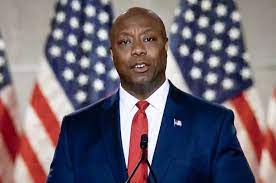The Future of the Republican Party

Senator Tim Scott gives his response to President Joe Biden’s address to Congress.
May 28, 2021
After the ending of an eventful four years of the Trump administration, including the former president’s false claims regarding the validity of the 2020 vote and the subsequent insurrection at the capital, the future of the Republican Party has become the subject of much discourse.
Last month, Sen. Tim Scott delivered the Republican response to President Joe Biden’s address to Congress. The speech, praised by some Republicans, addressed Republican criticism of the president’s new policies. Senate Minority Leader Mitch McConnell (R-Ky) even addressed Scott’s remarks.
“We’re looking to the future, not the past, and if you want to see the future of the Republican Party watch Tim Scott’s response to President Biden. He’s the future, that’s where we’re headed,” says McConnell.
However, the speech itself is fundamentally problematic: Officials are to deliver remarks answering a speech they haven’t actually heard or seen. And yet, McConnell’s acknowledgement of Scott presents a very dismal future for Republicans.
The senator brought up the fact that Biden is enacting policies that Republicans disagree with — a sort of unnecessarily obvious point since Democratic presidents are naturally going to disagree with Republican policymakers.
He goes further to complain about the Democrats’ COVID relief package and Biden’s infrastructure plan, a plan supported by almost 7 in 10 Americans.
Scott’s speech reflected an interesting pattern. Instead of focusing on a Republican vision or a Republican alternative, Scott simply criticized Biden’s policies, policies for which were part of Biden’s campaign promises and given popular mandate. It’s part of a larger pattern of Republican lawmakers’ failure to present worthwhile legislation, choosing instead to linger on the past perceived triumphs of Trump’s presidency.
Liz Cheney’s removal from GOP leadership is yet another example of the Republican Party’s refusal to move forward from the Trump administration, specifically from Trump’s false claims of election fraud. State voting bills in Georgia, for example, would allow for partisan legislative control of the voting process. In Arizona, state Republicans are apparently investigating conspiracy theories of votes supposedly coming in from Asia.
And above all, Trump continues to argue that the election was stolen from him in recent interviews. Cheney’s ousting from the third-ranking party post in the chamber represents Trump’s control over the party and shows Republican willingness to discard established policymakers in favor of Trump.
In a rousing Washington Post op-ed, Cheney says, “Trump is seeking to unravel critical elements of our constitutional structure that make democracy work — confidence in the result of elections and the rule of law.”
She goes on to explain, “I am a conservative Republican, and the most conservative of conservative values is reverence for the rule of law.”
Evaluating all of these events, there still remains the question: what does this mean for the Republican Party, and for American democracy as a whole?
“I’m not optimistic in the short to medium term,” says Brian Klaas, an associate professor at University College London. “The political dynamics in the Republican party have created a self-reinforcing authoritarian loop.”
Speaking the truth about the election results means political demise for Republican politicians. Supporting Trump and his anti-democratic rhetoric is not only expected, but it can lead to stardon within the party and conservative media instead of being a party of policy-making and governing.
